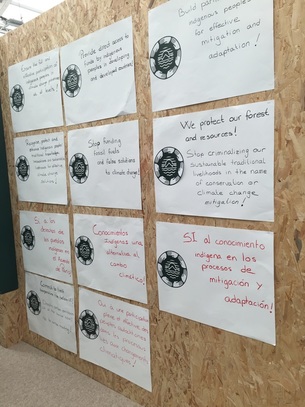 Indigenous peoples are some of the most vulnerable to the impacts of climate change, yet have contributed the least to the anthropogenic causes of climate change. On top of this, around 65% of the Earth's land surface is owned by approximately 370 million Indigenous Peoples from 70 different countries. Yet, Indigenous People are continually left out of international agreements and sadly the Paris Agreement is no exception. Now, if you read the entirety of the Paris Agreement (link at the bottom of this post), you will notice that there is one mention of indigenous people. That line states "acknowledging that climate change is a common concern of humankind, Parties should, when taking action to address climate change, respect, promote and consider their respective obligations on human rights, the right to health THE RIGHTS OF INDIGENOUS PEOPLES, local communities. . ." However, it is important to take note that this statement is in the preamble to the Paris Agreement, and the preamble is non binding. So even as countries ratify the agreement, there is nothing obligating them to follow what is written in the preamble. In addition, the statement starts with "Parties SHOULD." Any statements that follow the verb "should" are not legally binding, only when statements follow the verb "shall" are they legally binding. In early drafts of the Paris Agreement there was a section, Article 2.2, that focused on the protection of Indigenous Rights. However, strong opposition from the United States, European Union and Norway, resulted in the removal of this section and Indigenous Rights were diminished to that one small, non-binding statement in the preamble. There is one other reference to Indigenous Peoples' Traditional Knowledge in Article 7. The statement reads "Parties acknowledge that adaptation action should follow a country-driven, gender-responsive, participatory and fully transparent approach, taking into consideration vulnerable groups, communities and ecosystems, and should be based on and guided by the best available science and, as appropriate, traditional knowledge, knowledge of indigenous peoples and local knowledge systems, with a view to integrating adaptation in to relevant socioeconomic and environmental policies and actions, where appropriate." While this statement doesn't make use of the non legally binding word "should" it does use the phrase "where appropriate" and in turn does not hold countries accountable for actually incorporating traditional knowledge into adaptation actions. Many Indigenous Rights leaders are also quick to point out that while there was a large presence of Indigenous Peoples at COP 21, most of their presentations were relegated to the Green Zone. The Green Zone was the zone open to the public and comprised of civil societies. There was much less Indigenous presence in the Blue Zone, the area where countries had pavilions and where the negotiations were actually occurring. Very few Indigenous leaders were even permitted to take part in the negotiations. However, Indigenous Peoples are not going to give up. They have already written letters, made speeches and held protests, showing their disappointment in the Paris Agreement, and plan to continue the fight on an international level to have their voices heard. Paris Agreement- https://unfccc.int/resource/docs/2015/cop21/eng/l09r01.pdf Other sources and references: http://www.iipfcc.org https://www.culturalsurvival.org/news/annexed-rights-indigenous-peoples-un-climate-change-conference-2015 http://www.carnegiecouncil.org/en_US/publications/ethics_online/0113
0 Comments
Leave a Reply. |
Categories
All
Archives
March 2024
|
 RSS Feed
RSS Feed
